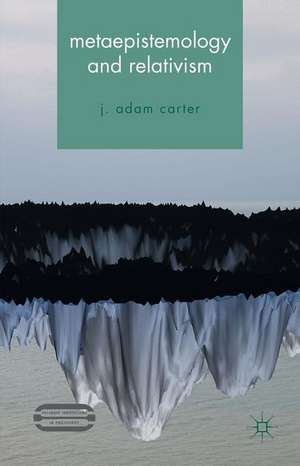Metaepistemology and Relativism: Palgrave Innovations in Philosophy
Autor J. Carteren Limba Engleză Hardback – 2 apr 2016
Din seria Palgrave Innovations in Philosophy
-
 Preț: 386.81 lei
Preț: 386.81 lei -
 Preț: 396.40 lei
Preț: 396.40 lei -
 Preț: 387.75 lei
Preț: 387.75 lei - 15%
 Preț: 637.59 lei
Preț: 637.59 lei -
 Preț: 387.38 lei
Preț: 387.38 lei - 18%
 Preț: 730.16 lei
Preț: 730.16 lei - 15%
 Preț: 582.80 lei
Preț: 582.80 lei -
 Preț: 389.49 lei
Preț: 389.49 lei - 15%
 Preț: 640.55 lei
Preț: 640.55 lei - 15%
 Preț: 647.40 lei
Preț: 647.40 lei - 18%
 Preț: 732.52 lei
Preț: 732.52 lei - 18%
 Preț: 894.46 lei
Preț: 894.46 lei - 18%
 Preț: 955.70 lei
Preț: 955.70 lei - 15%
 Preț: 534.50 lei
Preț: 534.50 lei - 15%
 Preț: 499.26 lei
Preț: 499.26 lei -
 Preț: 386.22 lei
Preț: 386.22 lei
Preț: 700.29 lei
Preț vechi: 823.86 lei
-15% Nou
Puncte Express: 1050
Preț estimativ în valută:
134.00€ • 140.19$ • 111.31£
134.00€ • 140.19$ • 111.31£
Carte tipărită la comandă
Livrare economică 03-17 aprilie
Preluare comenzi: 021 569.72.76
Specificații
ISBN-13: 9781137336637
ISBN-10: 1137336633
Pagini: 298
Ilustrații: XIV, 298 p.
Dimensiuni: 140 x 216 x 19 mm
Greutate: 0.51 kg
Ediția:1st ed. 2016
Editura: Palgrave Macmillan UK
Colecția Palgrave Macmillan
Seria Palgrave Innovations in Philosophy
Locul publicării:London, United Kingdom
ISBN-10: 1137336633
Pagini: 298
Ilustrații: XIV, 298 p.
Dimensiuni: 140 x 216 x 19 mm
Greutate: 0.51 kg
Ediția:1st ed. 2016
Editura: Palgrave Macmillan UK
Colecția Palgrave Macmillan
Seria Palgrave Innovations in Philosophy
Locul publicării:London, United Kingdom
Cuprins
1. Metaepistemology and Realism
2. Global Relativism
3. The Pyrrhonian Argument for Epistemic Relativism
4. Dialogic Arguments for Epistemic Relativism
5. Incommensurability, Circularity and Epistemic Relativism
6. Replacement Relativism: Boghossian, Kusch and Wright
7. A Different Kind of Epistemic Relativism
8. New Relativism: Epistemic Aftermath
9. Metaepistemology and Relativism
2. Global Relativism
3. The Pyrrhonian Argument for Epistemic Relativism
4. Dialogic Arguments for Epistemic Relativism
5. Incommensurability, Circularity and Epistemic Relativism
6. Replacement Relativism: Boghossian, Kusch and Wright
7. A Different Kind of Epistemic Relativism
8. New Relativism: Epistemic Aftermath
9. Metaepistemology and Relativism
Recenzii
“Metaepistemology and Relativism is an important contribution to the literature. It is one of the first attempts to evaluate the epistemological implications of MacFarlane’s brand of epistemic relativism. … this book seeks to understand what relativism is before condemning it. I am happy to recommend it as a model for how to work on the problem of relativism today.” (Robin McKenna, International Journal for the Study of Skepticism, Iss. (7), 2017)
Notă biografică
J. Adam Carter is a Research Fellow in philosophy, working mainly in epistemology, at the EIDYN Research Centre at the University of Edinburgh. His work has appeared in (among other places) Noûs, Philosophy and Phenomenological Research, Analysis, Philosophical Studies and the Australasian Journal of Philosophy.
Textul de pe ultima copertă
Is knowledge relative? Many academics across the humanities are happy to say that it is. However, those who work in mainstream epistemology, the philosophical theory of knowledge, generally take for granted that it is not. Metaepistemology and Relativism questions whether the kind of anti-relativistic background that underlies most typical projects in mainstream epistemology can on closer inspection be vindicated. To this end, prominent and diverse argument strategies for epistemic relativism are considered and criticised. It is shown that a common weakness of more traditional argument strategies for epistemic relativism is that they fail to decisively motivate relativism over scepticism. Interestingly, though, this style of objection cannot be effectively redeployed against the new (semantic) variety of epistemic relativism—itself introduced only in the past decade. Although new (semantic) epistemic relativism constitutes an entirely different kind of challenge to mainstream epistemology than traditional forms, the new variety itself faces a dilemma. Once the dilemma is appreciated, it will be shown that the threat to mainstream epistemology that epistemic relativism is best understood as posing is in fact a very different one than we'd be originally inclined to think.





